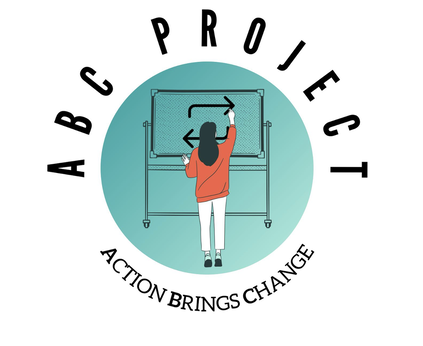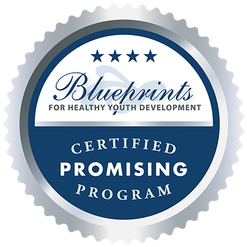The A.B.C. Project is designed to help teens take action towards managing their mental health.
|
The A.B.C. Project has been evaluated and endorsed by the board of Blueprints for Healthy Youth Development based on its strong evidence of effectiveness and scientific rigor.
To learn more about the Blueprints for Healthy Youth Development evaluation of The A.B.C. Project, visit their website here. |
Frequently Asked Questions
Who is this intervention designed for?
The A.B.C. Project is designed for youth (ages 11-17) who want to learn new ways of thinking and skills to help manage their moods.
How does this intervention help?
The A.B.C. Project teaches how engaging in valued activities can improve mental health.
What have we learned about this intervention so far?
Teenagers who tried The A.B.C. Project reported improvements in hopelessness, self-hatred, perceived control, and agency right after completing the intervention, as well as lasting reductions in depression symptoms, hopelessness, and restrictive eating three months later.
Where can I try out this intervention?
The A.B.C. Project is available on a broader platform called Project YES, which you can access by clicking here.
How do I cite this intervention?
Schleider, J. L., Mullarkey, M. C., Mumper, E., & Sung, J. Y. (2019). The ABC Project: Action Brings Change. Open Science Framework. https://doi.org/10.17605/OSF.IO/QJ94C.
Where can I access these intervention materials for research purposes?
Visit our Open Science Framework Page here.
The A.B.C. Project is designed for youth (ages 11-17) who want to learn new ways of thinking and skills to help manage their moods.
How does this intervention help?
The A.B.C. Project teaches how engaging in valued activities can improve mental health.
What have we learned about this intervention so far?
Teenagers who tried The A.B.C. Project reported improvements in hopelessness, self-hatred, perceived control, and agency right after completing the intervention, as well as lasting reductions in depression symptoms, hopelessness, and restrictive eating three months later.
Where can I try out this intervention?
The A.B.C. Project is available on a broader platform called Project YES, which you can access by clicking here.
How do I cite this intervention?
Schleider, J. L., Mullarkey, M. C., Mumper, E., & Sung, J. Y. (2019). The ABC Project: Action Brings Change. Open Science Framework. https://doi.org/10.17605/OSF.IO/QJ94C.
Where can I access these intervention materials for research purposes?
Visit our Open Science Framework Page here.
Publications
McDanal, R., Shen, J., Eaton, N., Fox, K., & Schleider, J. L. (invited revision, Clinical Psychological Science). Predicting Transdiagnostic Symptom Change across Diverse Demographic Groups in an RCT of Single-Session Interventions for Adolescent Depression.
Eyllon, M., Dalal, M., Jans, L., Sotomayor, I., Peloquin, G., Yon, J., Fritz, R., & Schleider, J. L. (2023). Referring Adolescent Primary Care Patients to Single-Session Interventions for Anxiety and Depression: Protocol for a Feasibility Study. JMIR Research Protocols.
Ahuvia, I., Mullarkey, M. C., Sung, J. Y., Fox, K. R., & Schleider, J. L. (2023). Evaluating a Treatment Selection Approach for Online Single-Session Interventions for Adolescent Depression. Journal of Child Psychology and Psychiatry.
Shroff, A., Roulston, C. A., Fassler, J., Dierschke, N. A., San Pedro Todd, J., Rios, Á., Plastino, K., & Schleider, J. L. (2023). A Digital Single-Session Intervention Platform for Youth Mental Health: Cultural Adaptation, Evaluation, and Dissemination. JMIR Mental Health.
*Schleider, J.L., Mullarkey, M.C., Fox, K.R., Dobias, M.L., Shroff, A., Hart, E.A., Roulston, C. (2022). A Randomized Trial of Online Single-Session Interventions for Adolescent Depression during COVID-19. Nature Human Behaviour, 6, 258-268.
Dobias, M. L., Morris, R., & Schleider, J. L. (2022). Single-session interventions embedded within Tumblr: Acceptability, Feasibility, and Utility Study. JMIR Formative Research, 6(7):e39004.
McDanal, R., *Rubin, A., Fox, K. R., & Schleider, J. L. (2022). Associations of LGBTQ+ Identities on Acceptability and Response to Online Single-Session Youth Mental Health Interventions. Behavior Therapy.
Schleider, J.L., Dobias, M.L., Sung, J.Y., Mumper, E., & Mullarkey, M. C. (2020). Acceptability and utility of an open-access, online single-session intervention platform for adolescent mental health. JMIR Mental Health, 7(6):e20513.
*Randomized-controlled trials
Eyllon, M., Dalal, M., Jans, L., Sotomayor, I., Peloquin, G., Yon, J., Fritz, R., & Schleider, J. L. (2023). Referring Adolescent Primary Care Patients to Single-Session Interventions for Anxiety and Depression: Protocol for a Feasibility Study. JMIR Research Protocols.
Ahuvia, I., Mullarkey, M. C., Sung, J. Y., Fox, K. R., & Schleider, J. L. (2023). Evaluating a Treatment Selection Approach for Online Single-Session Interventions for Adolescent Depression. Journal of Child Psychology and Psychiatry.
Shroff, A., Roulston, C. A., Fassler, J., Dierschke, N. A., San Pedro Todd, J., Rios, Á., Plastino, K., & Schleider, J. L. (2023). A Digital Single-Session Intervention Platform for Youth Mental Health: Cultural Adaptation, Evaluation, and Dissemination. JMIR Mental Health.
*Schleider, J.L., Mullarkey, M.C., Fox, K.R., Dobias, M.L., Shroff, A., Hart, E.A., Roulston, C. (2022). A Randomized Trial of Online Single-Session Interventions for Adolescent Depression during COVID-19. Nature Human Behaviour, 6, 258-268.
Dobias, M. L., Morris, R., & Schleider, J. L. (2022). Single-session interventions embedded within Tumblr: Acceptability, Feasibility, and Utility Study. JMIR Formative Research, 6(7):e39004.
McDanal, R., *Rubin, A., Fox, K. R., & Schleider, J. L. (2022). Associations of LGBTQ+ Identities on Acceptability and Response to Online Single-Session Youth Mental Health Interventions. Behavior Therapy.
Schleider, J.L., Dobias, M.L., Sung, J.Y., Mumper, E., & Mullarkey, M. C. (2020). Acceptability and utility of an open-access, online single-session intervention platform for adolescent mental health. JMIR Mental Health, 7(6):e20513.
*Randomized-controlled trials

